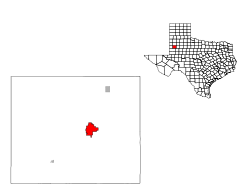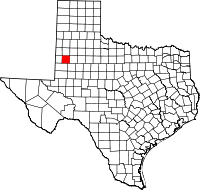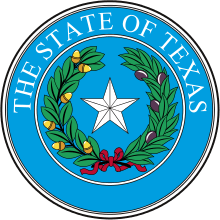Brownfield, Texas
| Brownfield, Texas | |
|---|---|
| City | |
|
Location of Brownfield, Texas | |
 | |
| Coordinates: 33°10′47″N 102°16′15″W / 33.17972°N 102.27083°WCoordinates: 33°10′47″N 102°16′15″W / 33.17972°N 102.27083°W | |
| Country | United States |
| State | Texas |
| County | Terry |
| Area | |
| • Total | 6.3 sq mi (16.4 km2) |
| • Land | 6.3 sq mi (16.4 km2) |
| • Water | 0.0 sq mi (0.1 km2) |
| Elevation | 3,310 ft (1,009 m) |
| Population (2009) | |
| • Total | 8,940 |
| • Density | 1,501.0/sq mi (579.6/km2) |
| Time zone | Central (CST) (UTC-6) |
| • Summer (DST) | CDT (UTC-5) |
| ZIP code | 79316 |
| Area code(s) | 806 |
| FIPS code | 48-10720[1] |
| GNIS feature ID | 1352989[2] |
Brownfield is a city in Terry County, Texas, United States. The population was 9,657 at the 2010 census. It is the county seat of Terry County[3] 39 miles southwest of Lubbock.
Geography
According to the United States Census Bureau, Brownfield has a total area of 6.3 square miles (16 km2), of which 0.32% is covered by water.
Brownfield lies in the center of Terry County, within the southern portion of the South Plains and Llano Estacado. The city rests on a windblown deposit called the Blackwater Draw Formation, which is underlain by a thick layer of caliche, referred to locally as the "Caprock". Beneath the caliche layer lies fluvial deposits called the Ogallala Formation, which contains a portion of the vast Ogallala Aquifer. The Caprock Escarpment, about 50 miles east, forms a rather precipitous drop of about 1,000 feet (305 m) and exposes various geologic layers. In early days, climbing the Caprock Escarpment was not easy for horse-drawn covered wagons.
The only terrain variation lies at the south end of the city, where Lost Draw carves a channel that runs across the entire county. Lost Draw formed over 10,000 years ago at the end of the last ice age when the climate of the area was much wetter. When the vast glaciers of the north retreated, they left numerous dry river channels crisscrossing the Llano Estacado. When settlers during the 1800s ventured across this area, they often went into these channels expecting to find water; however, unless significant rains had occurred recently, their search was in vain, with many of the parties becoming "lost", hence the name, Lost Draw.
The most notable geographic feature of Brownfield remains its red soil. The soil creates an almost iridescent red color during sunrise and sunset due to the high iron oxide content.
Climate
Brownfield lies in a semiarid temperate zone, where high winds and extreme temperature variations are the norm. The summers reach over 100°F (38°C) for multiple consecutive days. The winters often fall below freezing for extended periods, but snow remains unusual due to very little precipitation forming in the winter months.
The most significant time of the year for weather events starts in March and runs through September when severe thunderstorms form on the Great Plains. Massive amounts of rain, winds, hail, and a few tornadoes are to be expected at this time of year. Late thunderstorms that produce hail are significantly harmful to the local economy as it destroys the local cotton crop.
| Climate data for Brownfield, Texas (1981–2010) | |||||||||||||
|---|---|---|---|---|---|---|---|---|---|---|---|---|---|
| Month | Jan | Feb | Mar | Apr | May | Jun | Jul | Aug | Sep | Oct | Nov | Dec | Year |
| Average high °F (°C) | 54.9 (12.7) |
59.6 (15.3) |
67.3 (19.6) |
76.0 (24.4) |
84.2 (29) |
90.9 (32.7) |
92.4 (33.6) |
91.3 (32.9) |
84.9 (29.4) |
76.3 (24.6) |
64.7 (18.2) |
55.2 (12.9) |
74.8 (23.8) |
| Average low °F (°C) | 27.0 (−2.8) |
30.1 (−1.1) |
36.2 (2.3) |
44.1 (6.7) |
54.6 (12.6) |
63.0 (17.2) |
66.3 (19.1) |
65.2 (18.4) |
57.8 (14.3) |
47.2 (8.4) |
35.7 (2.1) |
27.7 (−2.4) |
46.2 (7.9) |
| Average precipitation inches (mm) | 0.68 (17.3) |
0.75 (19) |
1.03 (26.2) |
1.18 (30) |
2.71 (68.8) |
3.01 (76.5) |
2.39 (60.7) |
1.95 (49.5) |
2.39 (60.7) |
1.77 (45) |
0.89 (22.6) |
0.76 (19.3) |
19.50 (495.3) |
| Average snowfall inches (cm) | 2.0 (5.1) |
1.7 (4.3) |
0.2 (0.5) |
0.2 (0.5) |
0.0 (0) |
0.0 (0) |
0.0 (0) |
0.0 (0) |
0.0 (0) |
0.0 (0) |
0.6 (1.5) |
1.6 (4.1) |
6.4 (16.3) |
| Source: NOAA[4] | |||||||||||||
Economics
Cotton farming remains the backbone of not only Brownfield, but the entire South Plains in general. Cotton fields stretch for miles, and the harvest season in October has a frenzy of activity as harvesters (locally called cotton strippers), module makers, and module trucks are seen all over the county.
A significant haze also develops over the city as the local cotton gins go to work stripping the cotton from the burr, separating the seeds, and then compressing the cotton into 500-lb bales. The haze is actually fine cotton dust, and sometimes small drifts develop in the street resembling snow mixed with red soil.
Peanut growing has found a toehold on the economy, as have vineyards. In recent years, grape growing has shown Terry County as a prime producer of choice wine grapes. While no wineries are currently in the county, several notable ones are in the Lubbock area, about 30 miles northeast.
Oil production continues to form a small, but significant, part of the Brownfield economy.
Demographics
| Historical population | |||
|---|---|---|---|
| Census | Pop. | %± | |
| 1930 | 1,907 | — | |
| 1940 | 4,009 | 110.2% | |
| 1950 | 6,161 | 53.7% | |
| 1960 | 10,286 | 67.0% | |
| 1970 | 9,647 | −6.2% | |
| 1980 | 10,387 | 7.7% | |
| 1990 | 9,560 | −8.0% | |
| 2000 | 9,488 | −0.8% | |
| 2010 | 9,657 | 1.8% | |
| Est. 2015 | 9,736 | [5] | 0.8% |
The number of residents in prisons or correctional facilities is significantly above the state average.[7]
Only 61.5% of the population holds a high school degree or higher, 8.9% a bachelor's degree or higher, and 2.7% a master's degree or higher. About 6.1% of the population was unemployed in 2010.[7]
As of the census[1] of 2000, 9,488 people, 3,176 households, and 2,337 families resided in the city. The population density was 1,501.0 people per square mile (579.6/km²). The 3,735 housing units had an average density of 590.9 per square mile (228.2/km²). The racial makeup of the city was 24.56% White, 6.59% African American, 0.42% Native American, 0.25% Asian, 14.47% from other races, and 3.71% from two or more races. Hispanics of any race were 45.95% of the population.
Of the 3,176 households, 34.6% had children under the age of 18 living with them, 55.3% were married couples living together, 14.1% had a female householder with no husband present, and 26.4% were not families. About 24% of all households were made up of individuals, and 14.3% had someone living alone who was 65 years of age or older. The average household size was 2.68 and the average family size was 3.19.
In the city, the population was distributed as 27.2% under the age of 18, 9.8% from 18 to 24, 27.3% from 25 to 44, 20.0% from 45 to 64, and 15.8% who were 65 years of age or older. The median age was 35 years. For every 100 females, there were 109.5 males. For every 100 females age 18 and over, there were 111.6 males.
The median income for a household in the city was $26,504, and for a family was $32,076. Males had a median income of $23,637 versus $19,628 for females. The per capita income for the city was $13,854. About 21.8% of families and 26.0% of the population were below the poverty line, including 38.7% of those under age 18 and 13.5% of those age 65 or over.
Brownfield is served by a weekly newspaper, nearby stations KBXJ (FM) and KPET (AM), and the various Lubbock radio and TV stations. KKUB (AM) and KTTU-FM are licensed to Brownfield, but operate primarily from offices and studios in Lubbock.
Points of interest
The Brownfield post office contains a mural, Ranchers of the Panhandle Fighting Prairie Fire with Skinned Steer, painted in 1940 by Frank Mechau. Murals were produced from 1934 to 1943 in the United States through the Section of Painting and Sculpture, later called the Section of Fine Arts, of the Treasury Department.[8] The building now serves as the Brownfield Police Station.[9] A historical marker has been placed in front of the Brownville post office with text reading:
"Fighting A Prairie Fire by Frank Mechau. Mechau, a resident of Colorado, was selected by the WPA to paint a mural for the Brownfield Post Office which he completed in October 1940. The work of Frank Mechau stands as a magnificent documentation of the West. The promising young artist died in 1946."
Mechau described the mural in the following way: "The prairie fire was a demon of the Panhandle. Sixty square miles of range could be destroyed in a day's time. Once the flame began to spread there were few efficient ways to combat it. Plowing a line was too slow, backfiring too dangerous. Cowboys would fight the fire with wet sacks or kill a steer and partly skin it leaving the wet skin to drag behind in an effort to rub out the edge of the fire." (Terry County Historical Commission).[10]
Education
The City of Brownfield is served by the Brownfield Independent School District.
Brownfield High School was rated "Academically Unacceptable" by the Texas State Board of Education in 2011.[11]
For the 2012-2013 school year, Brownfield High School State of Texas Assessments of Academic Readiness test scores resulted in the following student passing scores:[12]
-23% of students passed writing
-45% of students passed algebra
-67% of students passed biology
-54% of students passed chemistry
-48% of students passed reading
-19% of students passed geography
Dry county status
Several town meetings were held in 2008 to discuss the issue of selling beer and wine within Terry County.[13][14] On November 4, a majority registered voters voted to legalize the sale of beer and wine in Terry County (1533 for, 1211 against).[15]
Notable people
- George Faught - member of the Oklahoma House of Representatives from District 14
- Ruben Garcia, Jr. - former executive assistant director of the Federal Bureau of Investigation
- Charles E. Maple (1932–2006) - journalist at the Brownfield News in the middle 1950s
- Gary P. Nunn - Texas country music singer and "Ambassador of Texas Music"
- Jim Rudd - former member of the Texas House of Representatives
- Sheryl Swoopes - Women's National Basketball Association star, Brownfield High School Class of 1989
- Don Walser - country music singer
See also
- Llano Estacado
- Caprock Escarpment
- West Texas
- U.S. Route 82 in Texas
- Yellow House Draw
- Yellow House Canyon
- Double Mountain Fork Brazos River
References
- 1 2 "American FactFinder". United States Census Bureau. Archived from the original on 2013-09-11. Retrieved 2008-01-31.
- ↑ "US Board on Geographic Names". United States Geological Survey. 2007-10-25. Retrieved 2008-01-31.
- ↑ "Find a County". National Association of Counties. Archived from the original on 2011-05-31. Retrieved 2011-06-07.
- ↑ "NOWData - NOAA Online Weather Data". National Oceanic and Atmospheric Administration. Retrieved May 6, 2013.
- ↑ "Annual Estimates of the Resident Population for Incorporated Places: April 1, 2010 to July 1, 2015". Retrieved July 2, 2016.
- ↑ "Census of Population and Housing". Census.gov. Archived from the original on May 11, 2015. Retrieved June 4, 2015.
- 1 2 Texas City Data, retrieved 7 November 2010.
- ↑ Park, Marlene and Gerald E. Markowitz, Democratic vistas: Post Offices and Public Art in the New Deal, Temple University Press, Philadelphia 1984
- ↑ "Police Headquarters Building Mural". livingnewdeal.org. Living New Deal. Retrieved 20 January 2015.
- ↑ "Brownsville, Texas WPA Mural". texasescapes.com. Texas Escapes. Retrieved 20 January 2015.
- ↑ "2011 District Accountability Summary- Brownfield ISD". Texas Education Agency. Retrieved 2012-01-31.
- ↑ "STAAR Test Results". Retrieved 7 November 2013.
- ↑ Lubbock Avalanche-Journal On-line, retrieved 18 April 2008. Archived August 17, 2015, at the Wayback Machine.
- ↑ Brownfield News, retrieved October, 2008. Archived August 11, 2015, at the Wayback Machine.
- ↑ Brownfield News, retrieved 4 November 2008. Archived August 11, 2015, at the Wayback Machine.

